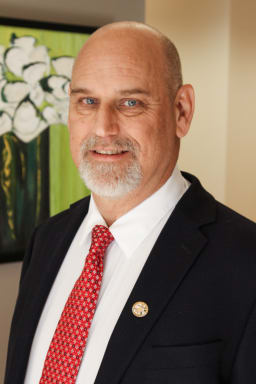Fifteen minutes before a 1pm hearing in Dena Bowers’ $1 million wrongful firing lawsuit, UVA administrators and their attorneys were downright giggly. Chief Financial Officer Yoke San Reynolds and UVA Recruitment Director Lucinda Childs-White—both named defendants in the suit—laughed and chatted along with lead counsel Richard Kast and other attorneys, their voices carrying over the microphone system in the grand, wood-paneled U.S. District Courtroom.
Other people started to arrive, some in suits, some in jeans, windbreakers, plaid shirts. Several asked, “Where’s Dena Bowers’ side?” There, they indicated, is where they would sit.
 Seeming more relaxed, Dena Bowers appeared in U.S. District Court on February 27. |
By 1pm, the main aisle of the courtroom could have been the scrimmage line at a rivalrous rugby match. The UVA team finally quieted down when Bowers and her attorney, local bulldog Deborah C. Wyatt, entered and took their seats behind the plaintiff’s table.
Many of the tenets of Wyatt’s case had already been pared down by other proceedings. All they had left were their constitutional arguments: Bowers says her First Amendment rights were violated in October 2005 when she was interrogated and fired after sending an e-mail through her University account that contained NAACP information critical of UVA’s chartered restructuring. She also argues her rights to due process under the 14th Amendment were denied when UVA fired her swiftly for “insubordination.” Proving these claims would be an uphill battle—UVA has immense resources for legal work and big constitutional claims can often rest on minute details.
UVA says Wyatt won’t be able to prove the individuals named in Bowers’ suit, including UVA Chief Operating Officer Leonard Sandridge, had a direct role in denying her First Amendment rights. They also say the e-mail wasn’t the only reason for her firing and that Bowers had ample opportunity to address the claims against her.
Wyatt must prove, among other points, that Bowers’ e-mail was sent in her personal capacity to inform people on a matter of public interest and that Bowers wouldn’t have been fired if she hadn’t sent the e-mail.
Though Moon ruled last October that Bowers’ constitutional claims could go forward, he interjected on many of Wyatt’s arguments at this hearing, while Bowers’ supporters groaned and sighed. Though many feel a moral attachment to the case, it was clear after two hours of banter that the conclusion may boil down to legal muscle.
Moon will soon issue an opinion that will either settle the suit or send it to jury trial later this month.
C-VILLE welcomes news tips from readers. Send them to news@c-ville.com.




